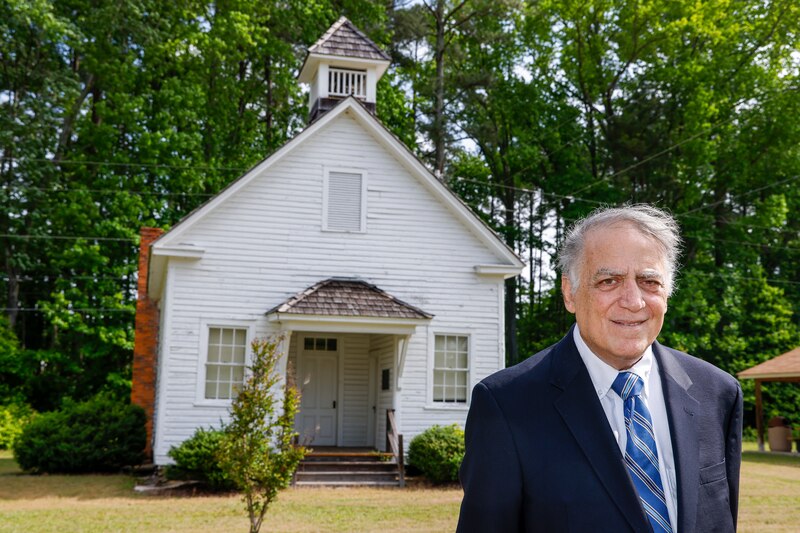This story was co-published with USA Today.
The staff meeting had just started, but Brian Hayes could not bear to wait. As soon as the first speaker finished addressing the room full of school counselors, Hayes raised his hand.
“I hate to interrupt,” he said in April. “But I feel like we really need to talk about this Parents’ Bill of Rights.”
Four days earlier, the school board in Moore County, North Carolina, had passed the policy. One of its provisions requires school personnel to notify parents if students ask to use different names or pronouns. Proponents said it was common sense: Parents need to know if their children want to change gender identities. But some counselors, including Hayes, believed that forcibly outing transgender and nonbinary students to their families could cause real harm.
The policy in Moore County, a Republican stronghold in the center of the state, is part of a nationwide crackdown on transgender youth.
Conservative lawmakers and school board members argue that the rise in gender nonconformity is due largely to educators promoting a permissive “gender ideology” and, often without parents’ knowledge, affirming students’ gender identities. To combat what they call indoctrination, Republicans have sought to roll back schools’ support for gender diversity.
An increasing number of states and school districts forbid teachers from discussing gender identity in class or using trans students’ correct pronouns without parents’ permission. Schools have been pressured to remove books with trans characters and to disband LGBTQ clubs, and forced to bar trans students from sports teams.
Last month, Florida Gov. Ron DeSantis, a Republican presidential candidate, signed bills that prohibit trans students from using pronouns and bathrooms in school that correspond with their gender identity. And last week the Louisiana legislature passed several bills targeting trans youth, including one allowing school employees to refuse to use students’ preferred pronouns.
School staffers generally are the ones to enact the restrictions — but some have refused to carry out policies they consider harmful to LGBTQ students.
The resistance includes administrators who decline to enforce the new rules and educators who openly flout or quietly disregard them, said Craig White, supportive schools director for the Campaign for Southern Equality, an LGBTQ advocacy group. While there is no national data to quantify the pushback, White said a growing number of school employees in recent months have sought his advice on how to fight the restrictions.
“The wave of anti-LGBTQ legislation,” he said, “has really catalyzed a grassroots resistance.”
At the Moore County meeting, counselors questioned the legality and ethics of the new policy. One asked the question that seemed to be hanging over the room: What would happen if they refused to comply?
But the next day, an official emailed them the new expectations: If a student asks to use a different name, counselors now must call their parents and ask for written permission.
Hayes recalled how he had counseled two trans students last year who were certain their parents would not accept their identities. Under the new policy, he would have been forced to inform the parents, even if it meant subjecting the students to rejection.
Hayes quickly drafted a reply to the official. He called the policy unethical and contrary to counselors’ duty to maintain student confidentiality. He asked about the consequences of non-compliance, then ended with a declaration.
“I am prepared to seek other employment if necessary to avoid violating my personal values and professional training,” he wrote. Then he hit send and waited.
A conservative majority takes shape on the board
Hayes grew up in Moore County, whose roughly 100,000 residents include military personnel connected to nearby Fort Liberty and retirees drawn to the area’s luxury golf courses, along with many working-class families. He attended Moore County Schools and worshiped at a fundamentalist Christian church, which taught that homosexuality was an abomination.

After college, he enrolled in divinity school, where he began questioning what he had been taught. Eventually he made a radical change of plans: He would become a school counselor, one who affirms every student and condemns none.
After finishing a graduate program in school counseling in 2018, he took a counseling job at a Moore County middle school. He and his wife hadn’t planned on moving there, but he was drawn to the principal’s focus on social-emotional learning and the district leadership’s professed commitment to racial equity.
“Maybe this area’s making strides,” he thought. “And I could be a part of that.”
But within a couple years, the very changes that pulled him back to Moore County Schools were under attack. One person leading the charge was Robert Levy.
Like Hayes, Levy grew up in Moore County. He returned after 40 years practicing law in California and Maryland. Semi-retired, he wrote a weekly column in the local paper, briefly worked as a substitute teacher and served as chairman of the Moore County Republican Party.
In 2020, party members urged him to run for one of three open spots on the school board. Levy had concerns about some schools’ poor academic performance, as well as the board’s perceived liberal political leaning. He described the former board’s strategic plan — which called for a reduction in racial disparities in student discipline, more teacher diversity and support for students’ mental health — as “about 20 pages of woke ideas and a woke mindset.”
Levy ran and was elected alongside two other outspoken conservatives.
Early on, he proposed two policies: A ban on critical race theory in the district’s curriculum and a requirement that students’ biological sex determine which bathrooms they use and sports teams they play on. Outnumbered on the seven-member board, the three conservatives failed to pass the policies.
In March 2022, the trio voted to remove a book about a transgender child from two school libraries after a community member challenged it. Again they failed.
That summer, the board discussed school discipline disparities. Last school year, Black students in Moore County were suspended at nearly four times the rate of white students, according to state data on short-term suspensions, which can last up to 10 days.
At a board meeting, Levy blamed the disparities on students’ race and poverty.
“Minorities tend to be poorer. They tend to be less disciplined,” he said, according to the local Pilot newspaper. As a result, “you are going to get a disparity in numbers between disciplining of minorities and disciplining of the majority cultures.”
Some community members condemned the racist remarks. In an email to Chalkbeat, Levy said his point was that poverty, not race, makes students “more prone to discipline problems.”
Last November, Levy opposed adding the phrase “gender identity” to a board document. In a Facebook post, he accused the board’s “liberal members” of trying to redefine sex so that “male students who ‘identify’ as females and females who erroneously believe themselves male were to be a protected class.”
In the post, he urged voters to choose the three conservative candidates in that month’s school board election in order “to protect our children from woke attacks and free flowing sexualization of children.”
The conservatives prevailed in the election, gaining a 6-1 majority. Levy became the board chair and vowed to introduce a parents’ bill of rights.
Hayes watched with dread. If the policy passed, he would have to choose which to follow: his orders or his convictions.
“I kind of knew,” he said, “it was going to be an ultimatum.”
A community debates parents’ rights — and students’
A few months after the election, the Robbins Elementary School auditorium crackled with nervous energy. The school board was set to vote on the parents’ rights policy, but first, members of the community were to weigh in.
“Let me say that I know people are concerned about certain things, certain portions, of our business,” Levy told the crowd. “Please try to be civil.”

The policy stipulates that schools must notify parents before giving surveys or providing services related to students’ mental or physical health. But its most controversial provision was the requirement that schools alert parents if students want to change their gender expression.
Republicans across the country have pushed similar parent-notification rules. (The Moore County policy lifts language directly from Virginia guidelines and a North Carolina bill.) The rules target the practice in some schools of allowing gender-nonconforming students to switch names and pronouns without telling parents. To avoid outing them, some schools use students’ chosen names in class and their birth names when calling home.
Some educators and advocates defend the practice as protecting trans students’ privacy and safety, adding that most schools encourage students to eventually come out to their families. But critics say schools should never withhold important information from parents, adding that parents can’t support trans children if they aren’t informed.
While most parent-notification rules do not take a stance on gender nonconformity, some of the advocates and lawmakers pushing the policies have suggested that transgender students are confused or were pressured by educators.
Levy is skeptical of people who identify as trans, saying in an interview that he personally does not believe that someone can “wish a different gender.” But he said the notification policy lets parents decide how to respond.
“It is not for me to support or not to support students in what is called their gender identity,” he told Chalkbeat. “Our job is to teach them reading, writing, and math.”
The Moore County school board scheduled a vote on the “Parents’ Bill of Rights” for its April 17 meeting. Word spread quickly: A local LGBTQ center urged allies to attend the meeting to oppose the policy, while a local conservative activist implored “Christian conservatives” to support the policy in order to “protect our kids.”
On the evening of the meeting, a group of high schoolers filed into the back of the auditorium. Among them was Atlas, a ninth grader at Pinecrest High School who came out as transgender to his family and fellow marching band members last summer.
Most people at school respected his identity, but not everyone. One teacher refused to refer to transgender students by their correct names and pronouns or let them use a private dressing room for gym class. Atlas and his friends reported the teacher to the administration, but the issue persisted, he said. (A district spokesperson and the superintendent did not respond to emailed questions.)
Trans kids already felt unsafe in many places; with the notification, now they would feel exposed even in their counselor’s office. When Atlas’ name was called at the meeting, he stepped up to the podium and tried to help the board members understand.
“This proposed bill will hurt many students in our schools,” he began.
He cited national statistics showing that LGBTQ students, and transgender youth especially, are far more likely than their peers to consider or attempt suicide. The same is true in Moore County, where a 2017 survey found that 46% of gay, lesbian, and bisexual high school students had seriously considered suicide — compared with 14% of their straight peers.
“The students you were elected to represent are the faces of these statistics,” Atlas told the board, and his friends cheered.
Other speakers praised the proposed policy. One woman said some people want to change “the actual truth” that children are either male or female. A pastor warned about a slippery slope from supporting transgender youth to letting students dress up as animals.
One of the final speakers, who identified himself as Colin Wilson, said he and his wife pulled their child out of public school after the child came out as nonbinary. Now home-schooled, the child is a “well-adjusted female,” Wilson said, which is why schools must notify parents if children question their gender.
“If we don’t know,” he said, “we can’t address our children the way we see fit.”
During the board’s discussion, the one member who is not part of the conservative bloc said she opposed the policy because it targets LGBTQ students. She recalled how a school counselor had helped her nephew navigate the process of telling his parents that he is transgender.
Levy insisted that the policy is not directed at any particular group. “If you aim it solely at transgender youth, then you have a constitutional problem,” he said.
Yet during the same discussion, he suggested that the policy is intended to inform parents about children who want to change their gender expression. “Nobody is going to care” if a student named Robert asks to go by Rob, Levy said in response to another member’s question.
But “when Robert wants to be called Roberta,” he said later, “a parent needs to know.”
The board approved the policy by a vote of 6-1. It appeared to have an immediate chilling effect.
Rebecca Beittel, a Pinecrest English teacher, said a colleague started calling students by their last names in order to sidestep the name-change policy. Hayes said his trans students avoided discussing the policy; he worried that they no longer felt safe opening up to him. Noah, a Pinecrest student who is trans, said a classmate asked him and some friends if it was still OK to share their gender identity with teachers.
“We were all like, ‘Don’t!’” Noah said. “‘Don’t tell the teachers.’”
Students and staff resist the policy
Two days after the vote, Atlas led a few dozen Pinecrest students in a school walkout during third period. A TV news crew covered the protest, while supportive parents stood across the street and cheered.
Beittel, who plans to leave the district after this school year, joined the walkout. She said students have told her that their parents would reject them if they learned they’re trans.
“The only place where they feel comfortable being their authentic selves is in my classroom,” she said. But “with this new policy, a kid can no longer trust us to be that person where they can be safe and comfortable.”

A few other staffers also spoke out. Kindergarten teacher Michele Cunningham said at the April board meeting that the policy would strip trans students of the “right to come out on their own terms.” Middle school counselor Renee Portfilio wrote an op-ed saying the policy violates counselors’ ethical duties and students’ privacy rights.
Hayes sought professional guidance. One group he contacted said ethics are a guide, but they don’t supersede local laws and policies. The American School Counselor Association’s ethical standards say counselors must maintain confidentiality, but also that students’ right to privacy “at times may be limited” by other interests, including parents’ rights.
Families in several states have sued school officials and counselors, alleging that they violated parents’ rights by affirming students’ gender identity without parental consent. Last month, 21 conservative state attorneys general filed an amicus brief supporting a Florida family’s lawsuit. The brief says schools across the country have “shut parents out” of decisions about their children’s gender identity “and trampled on their fundamental rights.”
In late May, Moore County Schools Superintendent Tim Locklair met with the school counselors to discuss their concerns. He advised them to comply with the parent-notification policy while also following their code of ethics, according to two attendees. “I trust your professional judgment,” he said. (Locklair did not respond to requests for comment.)
The guidance frustrated Hayes, who considers the policy and his ethics irreconcilable.
“I don’t understand how those two things can go together,” he said, “when my professional judgment tells me to violate the policy.”
Some counselors hoped the board would revise the policy, but it has no current plans to do so, Levy told Chalkbeat in an email. As for counselors’ ethical concerns, he added, they have been told how to implement the policy “consistent with any perceived conflicts.”
Meanwhile, Levy intends to introduce a new policy forbidding staffers from advocating for or against controversial issues during class. “This includes but is not limited to gender, sex and the policies surrounding such matters,” reads the draft “Inclusion and Indoctrination” policy.
Not long after Hayes sent the email asking what would happen if counselors refused to follow the parent-notification rule, he received a reply. The administrator acknowledged his concerns, but said employees are expected to follow board policies, according to Hayes.
If following the policy meant outing transgender students against their will, Hayes didn’t see how he could ethically comply. For now the dilemma is theoretical, but eventually such a situation will arise — in Hayes’ school and other districts adopting similar policies. Then Hayes and like-minded educators will have to decide: Do they obey the new rules or resist?
“I feel like it’s time for somebody to take a stand,” he said. “If nobody ever says anything, these people are just going to take over.”






